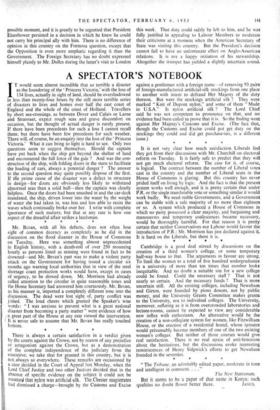Cambridge is a good deal stirred by discussions on the
creation of a third women's college, or some temporary half-way house to that. The arguments in favour are strong. To limit the women to a total of five hundred undergraduates in a university of more than ten times that number looks inequitable. And no doubt a suitable site for a new college could be found. Could the necessary staff ? That is not nearly so certain. And the necessary funds ? That is more uncertain still. All the existing colleges, including Newnham and Girton, were founded by pious donors, not by public money, and the University Grants Committee makes grants to the University, not to individual colleges. The University, moreover, suffering as it is from overcrowded laboratories and lecture-rooms, cannot be expected to view any considerable new influx with enthusiasm. An alternative would be the creation of a non-collegiate system for women, like Fitzwilliam House, or the erection of a residential hostel, whose inmates would pr6sumably become members of one of the two existing women's colleges. But neither of those courses would give real satisfaction. There is no real strain of anti-feminism about the hesitations, but the discussions evoke interesting reminiscences of Henry Sidgwick's efforts to get Newnham founded in the seventies.


































 Previous page
Previous page